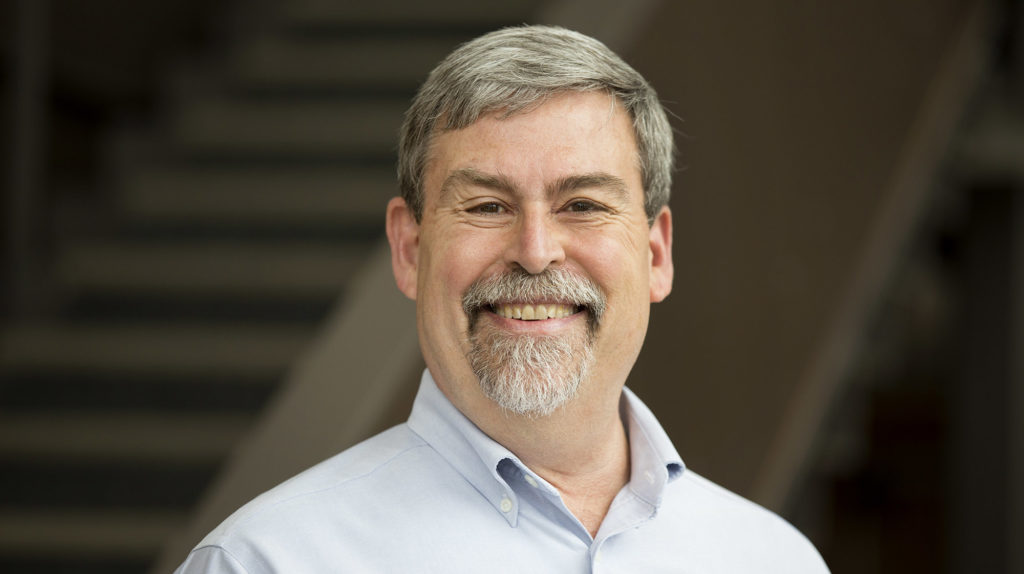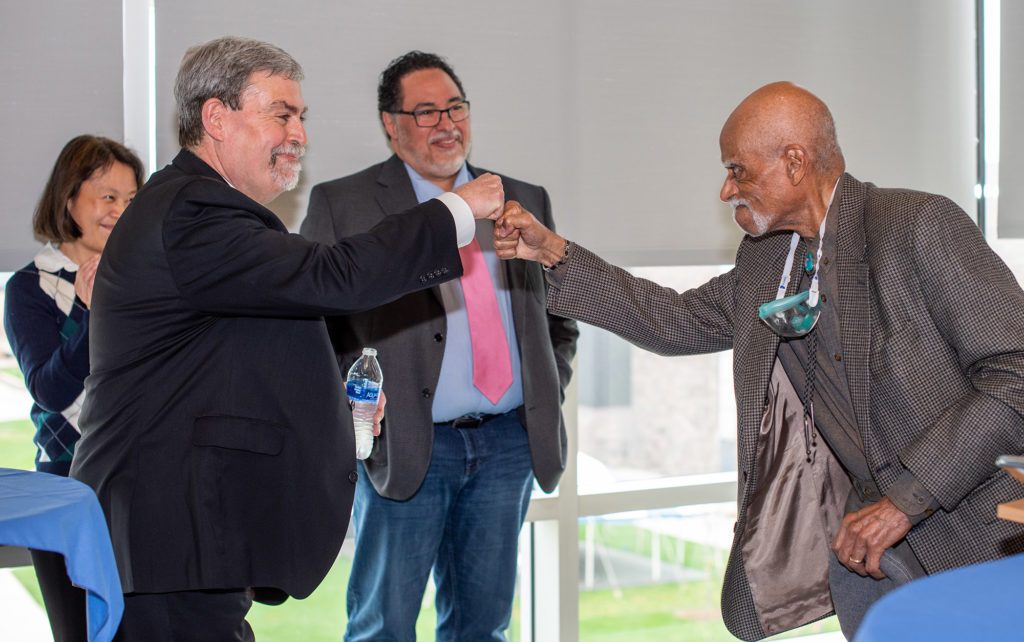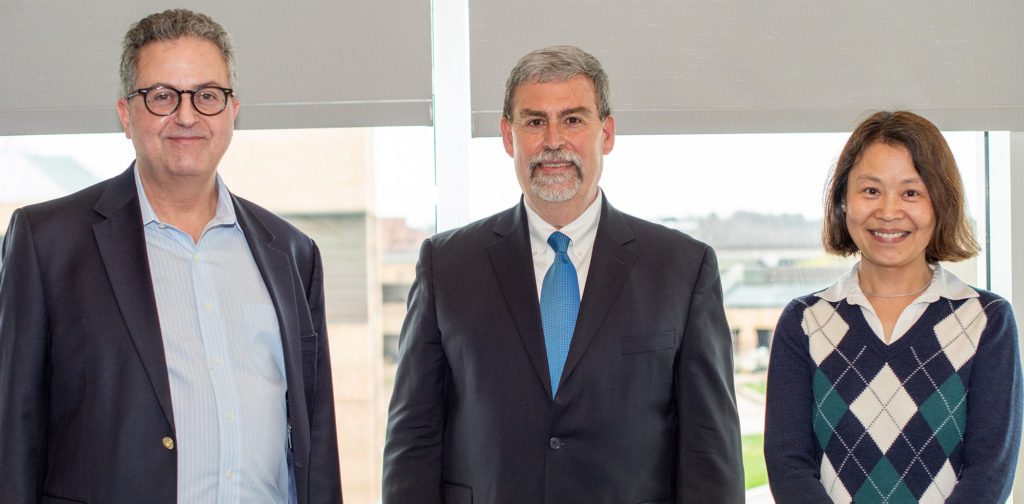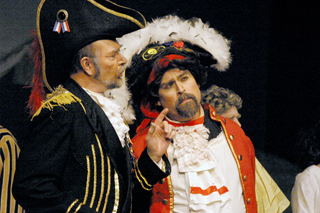Greg Wakefield, master of interdisciplinary everything, retires

Greg Wakefield, esteemed champion of interdisciplinary education and research, retires as a faculty member of Electrical Engineering and Computer Science on May 31, 2022. He leaves a legacy of lives deepened and broadened through his leadership in fostering connections between science and the arts at Michigan.
With his freshly-minted PhD in electrical engineering from the University of Minnesota, Greg joined the faculty of the Department of Electrical Engineering and Computer Science at Michigan in 1986. He combined the rigors of being a new faculty member with that of completing his second PhD in 1988, this one in psychology.
Greg specialized in the field of signal processing, specifically perceptual acoustics, music processing, time-frequency distributions, signal analysis and synthesis, sound quality engineering, computational audition, psychoacoustics, auditory prosthetics, and statistical signal processing.
The University belongs to the students. I really appreciate being part of their lives – being given the opportunity to teach them some things, to help train them, and to become a part of their foundation as they go forward.
Greg Wakefield
Shortly after arriving at Michigan, he joined a team of faculty working on cochlear implants for people with hearing loss.
“Greg made some remarkable contributions that are still in effect today,” said Dr. Brian Pfingst, professor of Otolaryngology. “Things like signal processing, selection of stimulation sites, and some interesting genetic algorithms.”
Greg, who maintained an appointment in Otolaryngology for most of his career, next moved on to time frequency research with former faculty member Bill Williams, who would introduce him to people at Ford with an interest in sound quality engineering.
“Suddenly I was able to leave the textbook psycho-acoustics that I was trained in and actually work with real sounds and real environments,” said Greg.
Greg later partnered with Mary Simoni, professor emerita of performing arts technology (PAT), and facilitated numerous collaborations between the fields of signal processing with music. He served as official and unofficial advisor to many PAT students, especially those who also were majoring in electrical engineering.
Over the past three years, Greg helped us do things I never thought we’d accomplish.
Deb Mexicotte, Managing Director, ArtsEngine
His ability to bridge multiple disciplines and to communicate and collaborate made him a cherished leader of programs like ArtsEngine. Greg was the first faculty advisor for this program that began in 2006; its mission is to deepen and enrich the Michigan experience by providing a framework in which curiosity, creativity, collaboration, and passion are engaged through interdisciplinary teaching, learning, research, and community.
“Over the past three years, Greg helped us do things I never thought we’d accomplish,” said Deb Mexicotte, Managing Director of ArtsEngine.
Among his accomplishments with ArtsEngine were the support of 55 student projects and 33 faculty and graduate student research projects; implementation of multiple multi-campus, large collaborative pieces between schools and colleges; and the creation, as key instigator, of Faculty Engineering Arts Student Teams, or FEAST, which brings together students from across campus in faculty led research teams. All this is expected to lead to an interdisciplinary certificate or minor program in the next year or two.
“It’s been part of my life’s vision to see these kinds of things and how well they work for a unique set of students and faculty,” said Greg. “This could have happened only here at Michigan.”
Greg’s devotion to student learning was apparent in his invaluable service to the department as chair of the EECS Curriculum Committee for nearly 20 years, and service as ABET coordinator for seven years for not one, but a total of three different undergraduate programs (EE, CE and CS).
Over the course of his career, Greg taught and/or developed an astounding 19 different courses at the undergraduate and graduate levels. Most were in the area of signal processing, but others brought a truly interdisciplinary flair to the classroom with courses like Stradivarius as Biologist, and Shaping the Sound of Bronze, where students designed, cast, and tuned bronze bells before performing with them.

Greg says he was inspired to create the course Stradivarius as Biologist after commencing with voice lessons with the renowned operatic tenor and teacher, George Shirley, the Joseph Edgar Maddy Distinguished University Professor of Voice. He presented his senior recital in the spring of 2006 (just months before his daughter began her studies in voice that fall).
The 88-year old Dr. Shirley attended Greg’s retirement celebration, and spoke about the importance of bringing together music with the sciences.
“This campus was created to include music, visual arts, and engineering,” said Dr. Shirley. “Greg represents that. It’s been an honor to meet him, share ideas with him, and share that magnificent instrument that he possesses.”
The course, Stradivarius as Biologist, shaped the career of Lucy Dhegrae, who took the course as a freshman interested in both music and the neurosciences. She would end up studying with Greg throughout her UG career, before moving to New York City where she has had a successful career in music.
“I’m still doing neuroscience and voice work as an adult and I hope it’s always part of my life,” said Degrae at the retirement party. “Thank you for fostering that. And thank you to the University of Michigan for letting someone like this be here.”
Greg graduated 18 doctoral students, who hold a wide variety of positions in academia and industry. It was one of these students, Maureen Mellody, who inspired the initial collaboration with George Shirley and also Freda Herseth on the acoustics of vocal pedagogy. Mellody is currently a Director, NRC Executive Office, with the National Academies of Sciences, Engineering and Medicine.
Most of Greg’s doctoral students hold traditional engineering positions in industry and academia, but he also served on the committees of numerous doctoral students in the School of Music, Theatre & Dance. One of those individuals was Scott Piper, fellow tenor and now Chair of the U-M Voice Department.
“Your incredible attention to the spirit of what we are trying to promote in the department is an important factor in how we conceive of the expectations of our students at the doctoral level,” said Piper. “Thank you for your heart, thank you for your passion, thank you for the spirit and intelligence, thank you for the gift and the legacy you are leaving us in Voice.”

Coming full circle to his roots in both electrical engineering and psychology, Greg was asked to collaborate on a project involving multiple channel speech perception with Professor, now Emeritus, David Kieras. The project would last a full decade, and resulted in models for the so-called cocktail party effect (where humans are able to isolate an individual’s voice from the overall hubbub) that were the first to be both conceptually complete and quantitatively accurate.
“But there were other, personal, and often distracting, delights from working with Greg,” said Kieras, who is a professed fan of opera. “I heard Greg’s performance in the Gilbert & Sullivan comic operetta The Pirates of Penzance. He played and sang the Pirate King role absolutely perfectly!”

Greg has also performed with Ann Arbor’s Comic Opera Guild. And since 2006, he has served as the soloist at the First Christ of Christ, Scientist in Ann Arbor.
In his closing comments at his retirement celebration, Greg thanked many people for their support and inspiration over the years, but heading the list was his wife, Susan, followed by his three children, Elizabeth, Kate, and Patrick. With careers as a psychology professor, musical performer, and audio engineer, respectively, they are a unique trio of individuals who perhaps not coincidentally reflect the three major interests of their father. And he is about to begin a research project with Prof. Elizabeth Wakefield.
Throughout his career, Greg focused on broadening the student experience at Michigan, and was overwhelmed one day recently at an event that attracted numerous students, who were finally able to gather outside after pandemic restrictions.
“The University belongs to the students,” said Greg. “I really appreciate being part of their lives – being given the opportunity to teach them some things, to help train them, and to become a part of their foundation as they go forward. It has been a remarkable, totally unexpected, and totally fulfilling 36 years.”
 MENU
MENU 
